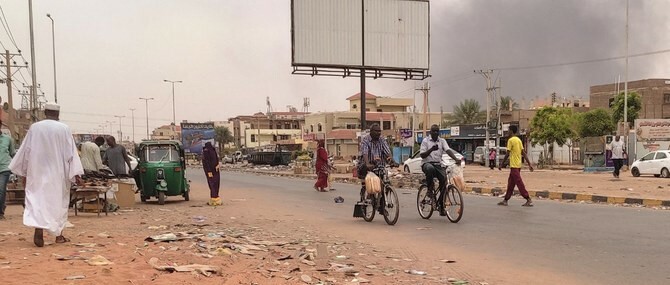A section of Sudanese citizens in the capital, Khartoum’s twin city of Omdurman, expressed mixed reactions on Friday as the security and humanitarian crises in Sudan continue to intensify.
The Darfur region is in turmoil, with the city of El-Fashir under siege. It’s surrounded by the paramilitary Rapid Support Forces, who have been fighting against the Sudanese army for more than a year now. The violence has killed thousands and displaced millions.
About 40 people were reported killed in “violent artillery fire” when the Rapid Support Forces targeted Omdurman on Thursday, pro-democracy activists said.
While some residents expressed disappointment in the lack of peace negotiations between the warring parties, others preferred the continuation of the war until a military victory was achieved.
Abdelmutaal Saboon, a resident of Omdurman, told Radio Tamazuj that he supports stopping the war through negotiations, explaining that both sides have committed violations that have harmed the citizens. He added: “We hope the war ends in any way and as quickly as possible, to save the country from ruin.”
Tahani Ismail, a 35-year-old housewife, said: “The RSF cannot be trusted. They lack mercy and humanity. Therefore, there should be no negotiations after what happened to the Sudanese people, who have lost and have been displaced.”
Namariq Al-Hadi, a 40-year-old displaced resident of Karari locality, agreed, telling Radio Tamazuj that she supports the continuation of the war because the people have lost everything and negotiations would weaken the Army’s position and make it submit to RSF.
Rasha Al-Khair, 30, said that she supports the Army’s decision, whether to negotiate or continue the war, as the Army knows what is best for the country and its citizens. She considers the war to be a battle for the dignity and survival for Sudan.
Political analyst Mohammed Abdelaziz said: “After a year of war in Sudan, it is clear that neither side has the ability to achieve a decisive victory.”
“This increases the likelihood of the conflict continuing for years, especially with the ongoing war economy and support for both sides, leading to a major catastrophe,” he added.
Abdelaziz explained that 11 million people either were displaced or had become refugees, with estimates indicating that more than 100,000 people have been killed in the war, and half of the Sudanese population was at a risk of famine, further complicating the situation.
He pointed out that it was crucial to reach a peaceful resolution to reduce the losses, as any attempts at a military solution may be ineffective, given the current balance of power.
The Sudanese army has recently ruled out any negotiations or truce with the Rapid Support Forces (RSF).
Army Assistant Commander Gen. Yassir Al-Atta made the declaration in a recent address to the wounded soldiers at the military zone in Karari, north of Omdurman.
The assertion seems to rebuff numerous international and regional calls to resume negotiations and return to the Jeddah Platform.
Prior to Al-Atta’s statement, the Deputy Chairman of the ruling Transitional Sovereignty Council, Gen Malik Aggar, announced the government’s refusal to comply with the US Secretary of State Antony Blinken’s request to the Council Chairman, Gen Abdel Fattah Al-Burhan, to return to the Jeddah Platform for negotiations.




